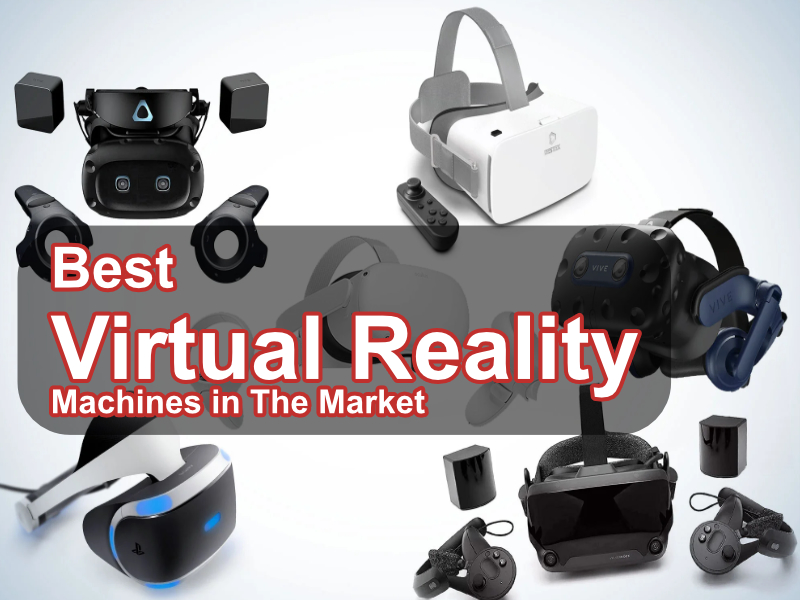"Virtual reality technology has come a long way in recent years, and with advancements in technology, it's now more accessible than ever. Whether you're looking for an immersive gaming experience, an engaging educational tool, or a powerful training tool for various industries, virtual reality machines are the way to go. In this blog, we will be discussing the top virtual reality machines available in the market, their pros and cons and how they compare to each other. From standalone devices to PC-based systems, we've got you covered. Join us as we explore the exciting world of virtual reality and help you find the perfect machine for your needs."
"Virtual reality machines have become a popular choice for gamers, educators, and professionals alike. They provide a fully immersive experience, allowing users to feel as though they are truly in the game or virtual environment. In this blog, we will be discussing the top virtual reality machines on the market, from standalone devices to PC-based systems, and everything in between. We will be providing you with a detailed overview of each machine's features, pros and cons, and how they compare to each other. Whether you're a hardcore gamer or a professional looking for a powerful training tool, we've got you covered."
- Oculus Quest 2: This VR machine is a standalone device that does not require a PC or console to operate. It offers high-quality graphics and a wide range of games and apps. Pros include its portability, ease of use and its standalone feature, Cons include its limited graphics compared to PC-based VR devices.
- PlayStation VR: This VR machine is designed to work with the PlayStation 4 and PlayStation 5 consoles. It offers a large library of games and a comfortable, user-friendly design. Pros include its large library of games, compatibility with PlayStation consoles and its comfortable design. Cons include its limited graphics compared to PC-based VR devices.
- HTC Vive Cosmos: This VR machine is designed for PC use and offers high-resolution graphics, a wide range of games and apps, and the ability to walk around in a virtual space using the device's "room-scale" technology. Pros include its high-resolution graphics and room-scale technology, Cons include its high cost and its requirement for a powerful PC to run.
- Oculus Rift S: This VR machine is designed for PC use and offers high-quality graphics, a wide range of games and apps, and the ability to walk around in a virtual space using the device's "room-scale" technology. Pros include its high-quality graphics and room-scale technology, Cons include its requirement for a powerful PC to run and its lack of portability.
- Samsung Odyssey+: This VR machine is designed for PC use and offers high-resolution graphics and a wide range of games and apps. It also features a high field of view and built-in headphones for an immersive experience. Pros include its high-resolution graphics and immersive experience, Cons include its requirement for a powerful PC to run and its lack of portability.
- Valve Index: This VR machine is designed for PC use and offers high-quality graphics, a wide range of games and apps, and advanced features such as finger tracking and haptic feedback for a more realistic experience. Pros include its high-quality graphics and advanced features, Cons include its high cost and its requirement for a powerful PC to run.
- HP Reverb G2: This VR machine is designed for PC use and offers high-resolution graphics and a wide range of games and apps. It also features a high field of view and built-in headphones for an immersive experience. Pros include its high-resolution graphics and immersive experience, Cons include its requirement for a powerful PC to run and its lack of portability.
- Acer Windows Mixed Reality Headset: This VR machine is designed for PC use and offers a wide range of games and apps. It also features a comfortable design and built-in headphones for an immersive experience. Pros include its comfortable design and immersive experience, Cons include its requirement for a powerful PC to run and its lack of portability.
- Lenovo Mirage Solo: This VR machine is a standalone device that does not require a PC or console to operate. It offers high-quality graphics and a wide range of games and apps. Pros include its portability and ease of use, Cons include its limited graphics compared to PC-based VR devices.
- Pimax 5K Plus: This VR machine is designed for PC use and offers high-resolution graphics and a wide range of games and apps. It also features a high field of view for an immersive experience. Pros include its high-resolution graphics and immersive experience, Cons include its requirement for a powerful PC to run and its lack of portability.

0 comments